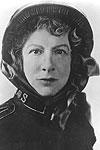
Eva Cory Booth, the seventh child of William and Catherine Booth, was born on Christmas day of 1865. It was the same year that her parents had responded to God’s call to minister to the poverty-stricken people in the East End of London. From the first, this variant, red-haired daughter promised great things.
Loudly outspoken against cruelty to animals, she early devised outreaches to the people of the slums. An early effort was a doll hospital, and in her early teens she was going about in the slums with her sisters, preaching and identifying with the poor. Looking for a way to get closer to others in the East End, she put on a tattered dress and joined the flower girls on the steps of the fountain in Picadilly Circus. Later she would enthrall audiences in this attire as she gave her dramatic presentation billed as “Miss Booth in Rags.”
Though William had agreed to the marriage of her sisters, Eva was convinced by her father that it was not in her best interests to marry. William had felt that such a strong personality as hers could best serve the cause as a single officer. However, she adopted four children, one of whom, Pearl, became an officer.
When World War I began, Evangeline launched a project, which, while only intended to help the war effort, did more to bring The Salvation Army into a position of prominence and respect than any other. Handpicked men and women officers (only men not of gun-bearing age) were dispatched to the front to render selfless and cheerful assistance wherever needed. These people, especially those known as the “Doughnut Girls” came to symbolize the work of the organization. Money poured into the coffers to expand an effort, which had been begun on a borrowed $25,000. This was the point at which the Army in the U.S. saw the end of ridicule and brickbats.
In 1896, Booth ordered Eva to Canada—a great responsibility which she handled well. That same year, she traveled to New York and with her persuasive oratory; she kept most of the officers from joining her brother Ballington when he formed his own organization, the Volunteers of America.
In 1904 she was given command in the United States. At this time, on the advice of friends, she changed her name to Evangeline. She was an excellent athlete and played several instruments. In fact, many of her songs are sung in the Army today (SASB 237, 288, 486, 830). Becoming an American citizen for business reasons, she remained a staunch American patriot all her days, and often used the flag to emphasize her dramatic presentations. Among her honors, Evangeline belonged to the Order of the Founder and received the U.S. Government’s Distinguished Service Medal.
As National Commander, Evangeline instituted many changes, including the division of the country into four territories. On November 11, 1934, Evangeline became the Army’s fourth general. She left America on the highest crest of love and popularity she had ever known, and retained her American citizenship. She then retired to her home in upstate New York until she was promoted to glory in 1950.
(Compiled and edited from the USA National Headquarters Website and the International Heritage Centre Website)